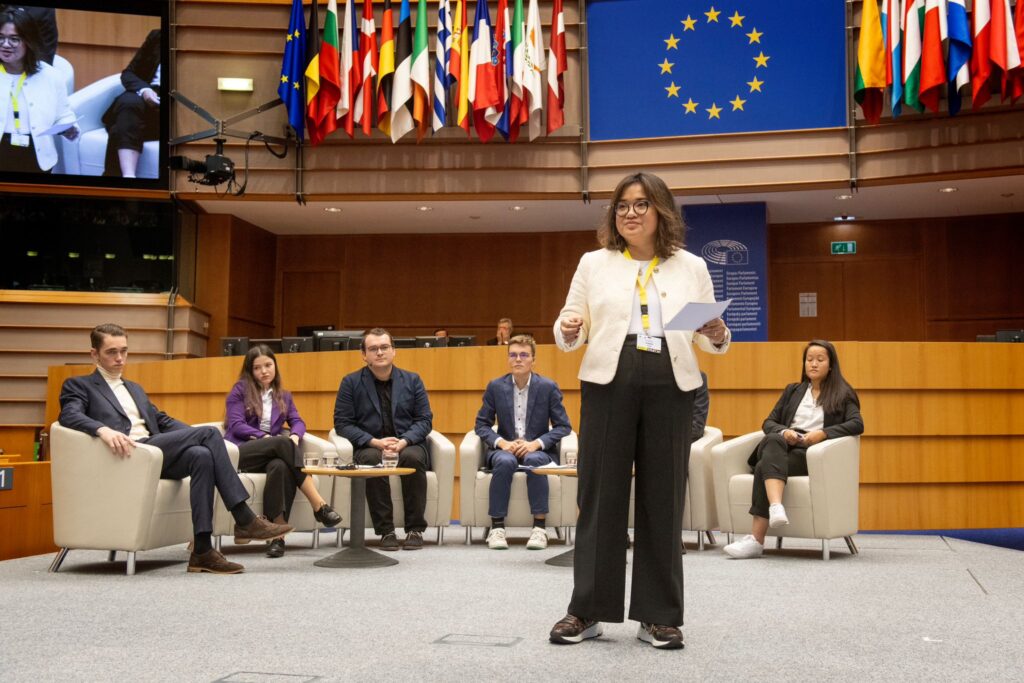From Diagnosis to Destiny: The Journey of Anita Hubner

With nearly a decade of dedicated experience, Alexandra Popescu-Zorica is…
It’s your first day at university. You’re young, vibrant, and full of passion. Nervous yet excited, you embark on your college journey with dreams of making an impact and changing the world.
In your first two years, you relish student life. You make many new friends and enjoy nights out at bars. You’re an excellent student, and your future seems incredibly promising.
As you transition into your third year, you start sleeping only 3-4 hours a night. Surprisingly, you don’t feel tired—on the contrary, you feel extremely happy and energized. You believe this newfound vitality is a sign of brilliance, sparking ideas on how you could save the world. But as your sleep deprivation intensifies, you end up hospitalized due to a severe psychosis and a diagnosis of bipolar disorder.
After four months of therapy, you tell your psychiatrist that you’re ready to return to college. He nods thoughtfully and says, ‘Those who have experienced psychosis or have been diagnosed with bipolar disorder will never fully recover. You’ll never be able to graduate or work. It’s best to live in an institution, depend on social welfare, and do volunteer work.’
This is the unfortunate narrative of young people who experience their first crisis and are swept away from their lives and sentenced to “no life.”
Many remain trapped by the expectations set for them. However, a few stubbornly challenge the odds and claim life on their own terms. These are the individuals who prove that there is another way—one that is more challenging but ultimately more meaningful in the long run. These people inspire others by sharing their stories, like Anita Hubner.
Anita was 21 when this story unfolded in front of her, but she refused to accept it. Behind her strong “no” was perseverance and resilience, as well as many tears and the weight of stigma. Despite all this, Anita is now a psychologist, book writer, and inspirational speaker. Young people who once shared her hospital room and diagnosis are now being treated by her. Doctors who once said, “You cannot move on” are now reading Anita’s book to learn that there is another way to approach a bipolar diagnosis.
Now that is a story worth sharing with the world. How could she not become an inspirational speaker?
Many people dream of being on stage and becoming motivational speakers. The idea of a room full of people applauding and asking for autographs is undeniably tempting. “If I could just have my 15 minutes of glory.” But would you really be prepared for the whole story, or only the part that involves the hall of fame?
Becoming a motivational speaker wasn’t something Anita planned. After all, you can’t just plan a life story and expect it to happen instantly. Who would plan such a difficult life? Her story isn’t about the diagnosis; it’s about how you respond when life throws obstacles in your path.
Ironically, working as a psychologist forced her into secrecy, even within a community of people who should have understood her best. Coming out as someone with bipolar disorder carried the risk of facing stigma and distrust from colleagues. It could also have frightened away patients.
It was 10 years ago, in 2014, when Anita decided to share her story with the world. Nervous and uncertain about what might happen next—whether she would lose her job,or face further stigma—Anita made her journey public. She made it her mission to show that people with bipolar disorder can lead meaningful lives and that conventional medicine must look deeper to find better solutions.
That moment also marked the beginning of her new career as an inspirational speaker.
There is nothing wrong with aspiring to become a motivational speaker, and there are many people out there with powerful stories to share. However, reaching that point is not easy, especially when your story is true and carries so much emotion.
Here are the five things Anita advises for anyone aspiring to become a motivational speaker:
- Know your “why”: Understand your motivation for becoming a motivational speaker. What is driving you? Knowing your purpose will help guide your journey.
- Consider your intent: Reflect on whether you are doing it for yourself or for others. Motivational speaking is not just about sharing your story, but about providing insights and inspiration to others.
- Embrace all opportunities: Once you’ve established your purpose and intent, accept any speaking engagement you can. This will help you practice public speaking, gain feedback, and improve your story.
- Build your network and visibility: Expand your connections and make yourself known through various channels. A strong network can open doors and provide support in your journey.
- Write a book: Sharing your experiences and insights in a book can extend your reach and establish your credibility as a motivational speaker.
If you think Anita has made her mark and can now slow down, think again. She has ambitious goals for her book: she aims to translate it into multiple languages, turn it into a bestseller, and have it published by the renowned agency New Harbinger. Additionally, she is advocating for her book to be included in the curricula at medical schools for students specializing in psychiatry.

Anita Hubner’s journey is far from over. Her drive to make a difference in the world is unwavering, and she continues to inspire others through her story and work. As she strives to expand the reach of her book and influence the future of psychiatric education, she stands as a testament to the power of resilience and the ability to transform adversity into a force for good. Anita’s story reminds us all that with courage, perseverance, and passion, we can turn life’s challenges into opportunities to make a meaningful impact.
More about Anita Hubner:
Anita is recognized as an authority on topics regarding stigma and mental health. She frequently features in the Dutch media, including newspapers, podcasts, radio and TV, regarding these issues.
Her book “To disclose or not to disclose” was translated in the Czech Republic.
The Czech translation of her book led to an invitation from the Czech Ministry of Health and Welfare to speak as keynote speaker at an international conference on mental health in young people at the European Parliament in Brussels. In front of an audience of 800 policymakers from across Europe, she began her keynote sharing her personal story with overcoming a psychosis when she was a student and becoming a psychologist, despite her psychiatrist’s initial doubts.
What's Your Reaction?
With nearly a decade of dedicated experience, Alexandra Popescu-Zorica is a seasoned consultant, mentor, and the dynamic host of a compelling podcast - House of Innovation, that delves into the challenges but also multiple benefits of fostering innovation and entrepreneurship in large organizations and societies. Alexandra's professional journey is marked by her hands-on expertise in building entrepreneurial teams and cultivating innovation capabilities within expansive corporate settings. Not only does Alexandra show tremendous passion for corporate innovation, but she is also deeply committed to nurturing the growth of startups. Having collaborated with over 100 startups, Alexandra has left a mark in transforming innovative ideas into thriving businesses, through her collaboration with startup accelerators and incubators such as Junior Achievement. In 2023, Alexandra's contributions to the field of Innovation were officially recognized by the esteemed Academy of Economic Studies. She was bestowed with a prestigious award in Innovation Management, a testament to her achievements and influence in shaping the future of business and entrepreneurship. Her hands-on experience is complemented by a fervent passion for continuous learning. Testimony to that commitment are the official recognitions and certifications in Design Thinking, Effectuation, Behavioral Science from the University of Toronto, as well as Managing Business Growth from Oxford. As a thought leader, mentor, and consultant, Alexandra Popescu-Zorica continues to inspire and guide individuals and organizations alike on their path to success in the dynamic worlds of corporate innovation and entrepreneurship. Her upcoming column in Gazetta promises to be a captivating exploration of the latest trends, strategies, and stories that define the ever-evolving landscape of business innovation. You can follow Alexandra on LI.



